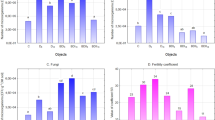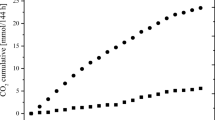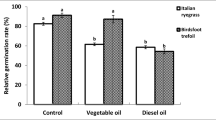Abstract
The worldwide spillage of fossil fuels causes an ever-increasing environmental concern due to their resistance to biodegradation and toxicity. The diesel fuel is one of the derivative forms of petroleum that is widely used in the world. Its composition has many aromatic compounds and long hydrocarbons chains, both persistent and hazardous, thus requiring complex microbial dynamics to achieve full biodegradation. At this point, biodiesel has advantages because it is produced from renewable sources. It also has a relatively fast biodegradation. Biodiesel formulation chemically varies according to the raw material used for its production. While vegetable oils tend to have homogeneous proportions of linoleic and oleic fatty acids, animal fats have an heterogeneous distribution of stearic, palmitic and oleic fatty acids. As some studies have already detected the toxic potential of biodiesel from vegetable oil, this study sought information on the phytotoxic and genotoxic potential of animal fat-based biodiesel and compare it with fossil fuel as diesel fuel and crude petroleum. The impacts on the microbial activity of soils contaminated with biodiesel, diesel fuel and crude petroleum were performed by the dehydrogenase activity. Phytotoxicity tests were performed with Eruca sativa seeds and genotoxicity bioassays with Allium cepa seeds. The results showed a rapid assimilation of biodiesel by the autochthonous soil microorganisms. Soil contaminated with either diesel or crude petroleum inhibited the root and hypocotyl elongation of E. sativa. Overall, petroleum contaminated soils showed higher genotoxic potential. Biodiesel from animal fat was rapidly assimilated by soil microorganisms and did not present significant phytotoxic or genotoxic potential, but significantly reduced the mitotic index of A. cepa roots. Our results showed that biodiesel from animal fat have rapid biodegradability. Biodiesel also led to less impacts during seed development and lower genotoxic potential when compared to crude petroleum and diesel fuel. In addition, biodiesel from animal fat does not present the same toxicity demonstrated by biodiesel from soybean-based biodiesel described in current literature.



Similar content being viewed by others
References
Adam G, Harry D (2002) Influence of diesel fuel on seed germination. Environ Pollut 120:363–370. https://doi.org/10.1016/S0269-7491(02)00119-7
Alef K (1995) Dehydrogenase activity. In: Alef K, Nannipieri P (ed) Methods in applied soil microbiology and biochemistry, 1st edn. Academic Press, Michigan, p 228–231
Bamgbose IA, Anderson TA (2015) Ecotoxicology and environmental safety phytotoxicity of three plant-based biodiesels, unmodified castor oil, and diesel fuel to alfalfa (Medicago sativa L.), lettuce (Lactuca sativa L.), radish (Raphanus sativus), and wheatgrass (Triticum aesti). Ecotoxicol Environ Saf 122:268–274. https://doi.org/10.1016/j.ecoenv.2015.08.003
Bamgbose IA, Anderson TA (2018) Assessment of three plant-based biodiesels using a Daphnia magna bioassay. Environ Sci Pollut Res 25:4506–4515. https://doi.org/10.1007/s11356-017-0678-7
Chabauty F, Pot V, Bourdat-Deschamps M, Bernet N, Labat C, Benoit P (2016) Transport of organic contaminants in subsoil horizons and effects of dissolved organic matter related to organic waste recycling practices. Environ Sci Pollut Res 23:6907–6918. https://doi.org/10.1007/s11356-015-5938-9
Cruz JM, Lopes PRM, Montagnolli RN, Tamada IS, Silva NMMG, Bidoia ED (2013) Phytotoxicity of soil contaminated with petroleum derivatives and biodiesel. Ecotoxicol Environ Contam 8:49–54. https://doi.org/10.5132/eec.2013.01.007
Cruz JM, Tamada IS, Lopes PRM, Montagnolli RN, Bidoia ED (2014) Biodegradation and phytotoxicity of biodiesel, diesel, and petroleum in Soil. Water Air Soil Pollut 225:1962–1965. https://doi.org/10.1007/s11270-014-1962-5
Cunha ME, Krause LC, Moraes MSA, Faccini CS, Jacques RA, Almeida SR, Rodrigues MRA, Caramão EB (2009) Beef tallow biodiesel produced in a pilot scale. Fuel Process Technol 90:570–575. https://doi.org/10.1016/j.fuproc.2009.01.001
Da Cruz ACS, Leite MBNLN, Rodrigues LEA, Andrade I (2012) Estimation of biodiesel cytotoxicity by using acid phosphatase as a biomarker of lysosomal integrity. Bull Env Contam Toxicol 89:219–224. https://doi.org/10.1007/s00128-012-0707-7
EIA-U.S. Energy Information Administration (2017) Monthly biodiesel production report. Washington, DC. https://www.eia.gov/biofuels/biodiesel/production/biodiesel.pdf
Fernandes TCC, Mazzeo DEC, Marin-Morales MA (2007) Mechanism of micronuclei formation in polyploidizated cells of Allium cepa exposed to trifluralin herbicide. Pestic Biochem Physiol 88:252–259. https://doi.org/10.1016/j.pestbp.2006.12.003
García-Llatas G, Rodríguez-Estrada MT (2011) Current and new insights on phytosterol oxides in plant sterol-enriched food. Chem Phys Lipids 164:607–624. https://doi.org/10.1016/j.chemphyslip.2011.06.005
Grant WF (1982) Chromosome aberration assays in Allium. A report of the U.S. environmental protection agency Gene-Tox program. Mutat Res 99:273–291
Guarino C, Spada V, Sciarrillo R (2017) Assessment of three approaches of bioremediation (Natural Attenuation, Landfarming and Bioagumentation e Assistited Landfarming) for a petroleum hydrocarbons contaminated soil. Chemosphere 170:10–16. https://doi.org/10.1016/j.chemosphere.2016.11.165
Hentati O, Lachhab R, Ayadi M, Ksibi M (2013) Toxicity assessment for petroleum-contaminated soil using terrestrial invertebrates and plant bioassays. Environ Monit Assess 185:2989–2998. https://doi.org/10.1007/s10661-012-2766-y
Lahel A, Fanta AB, Sergienko N, Shakya M, Estefanía ML, Behera SK, Rene ER, Park H (2016) Effect of process parameters on the bioremediation of diesel contaminated soil by mixed microbial consortia. Int Biodeterior Biodegrad 113:375–385. https://doi.org/10.1016/j.ibiod.2016.05.005
Leach NT, Jackson-Cook C (2004) Micronuclei with multiple copies of the X chromosome: do chromosome replicate in micronuclei. Mutat Res 554:89–94. https://doi.org/10.1016/j.mrfmmm.2004.03.004
Leme DM, Angelis DF, Marin-Morales MA (2008) Action mechanisms of petroleum hydrocarbons present in waters impacted by an oil spill on the genetic material of Allium cepa root cells. Aquat Toxicol 88:214–219. https://doi.org/10.1016/j.aquatox.2008.04.012
Leme DM, Grummt T, Palma D, Oliveira D, Sehr A, Renz S, Reinel S, Ferraz ERA, Rosa M, Marchi R, Canto M, Julião G, Marin-morales MA (2012) Genotoxicity assessment of water soluble fractions of biodiesel and its diesel blends using the Salmonella assay and the in vitro MicroFlow Ò kit (Litron) assay. Chemosphere 86:512–520. https://doi.org/10.1016/j.chemosphere.2011.10.017
MacKinnon G, Duncan JH (2013) Phytotoxicity of branched cyclohexanes found in the volatile fraction of diesel fuel on germination of selected grass species. Chemosphere 90:952–957. https://doi.org/10.1016/j.chemosphere.2012.06.038
Mazzeo DEC, Fernandes TCC, Marin-Morales MA (2011) Cellular damages in the Allium cepa test system, caused by BTEX mixture prior and after biodegradation process. Chemosphere 85:13–18. https://doi.org/10.1016/j.chemosphere.2011.06.056
Meudec A, Poupart N, Dussauze J, Deslandes E (2007) Relationship between heavy fuel oil phytotoxicity and polycyclic aromatic hydrocarbon contamination in Salicornia fragilis. Sci Total Environ 381:146–156. https://doi.org/10.1016/j.scitotenv.2007.04.005
Meyer DD, Beker SA, Bucker F, Peralba MCR, Frazzon APG, Osti JF, Andreazza R, Camargo FAO, Bento FM (2014) Bioremediation strategies for diesel and biodiesel in oxisol from southern Brazil. Int Biodeterior Biodegrad 95:356–363. https://doi.org/10.1016/j.ibiod.2014.01.026
Moser BR (2009) Biodiesel production, properties, and feedstocks. Vitr Cell Dev Biol Plant 45:229–266. https://doi.org/10.1007/s11627-009-9204-z
Murphy F, Devlin G, Deverell R, McDonnell K (2014) Potential to increase indigenous biodiesel production to help meet 2020 targets - An EU perspective with a focus on Ireland. Renew Sustain Energy Rev 35:154–170. https://doi.org/10.1016/j.rser.2014.03.046
Njoku KL, Akinola MO, Ige TO (2009a) Comparative effects of diesel fuel and spent lubricating oil on the growth of Zea mays (maize). Am Eurasia J Sustain Agric 3:428–434
Njoku KL, Akinola MO, Taiwo BG (2009b) Effect of gasoline diesel fuel mixture on the germination and the growth of Vigna unguiculata (Cowpea). Afr J Environ Sci Technol 3:12
OECD-Guideline for the testing of chemicals (2003) Terrestrial plant test: 208: Seedling emergence and seedling growth test. http://www.oecd.org/chemicalsafety/testing/33653757.pdf
Pereira SA, Araújo VQ, Reboucas MV, Vieira FSV, De Almeida MVA, Chinalia FA, Nascimento IA (2012) Toxicity of biodiesel, diesel and biodiesel/diesel blends: Comparative sub-lethal effects of water-soluble fractions to microalgae species. Bull Environ Contam Toxicol 88:234–238. https://doi.org/10.1007/s00128-011-0430-9
Serrano-Garca L, Montero-Montoya R (2001) Micronuclei and chromatid buds are the result of related genotoxic events. Environ Mol Mutagen 38:38–45. https://doi.org/10.1002/em.1048
Shimizu N, Shimura T, Tanaka T (2000) Selective elimination of acentric double minutes from cancer cells through the extrusion of micronuclei. Mutat Res Mol Mech Mutagen 448:81–90. https://doi.org/10.1016/S0027-5107(00)00003-8
Siddiqui S, Adams WA (2002) The fate of diesel hydrocarbons in soils and their effect on the germination of perennial ryegrass. Environ Toxicol 17:49–62. https://doi.org/10.1002/tox.10032
Sobrero MC, Ronco A (2004) Ensayo de toxicidad aguda con semillas de lechuga Lactuca sativa. In: Castillo G (ed.) Ensayos toxicológicos y métodos de evaluación de calidad de aguas. Estandarización, intercalibración, resultados y aplicaciones. IDRC, IMTA, Canadá, p 202
Souza TS, Hencklein FA, Angelis DF, Gonçalves RA, Fontanetti CS (2009) The Allium cepa bioassay to evaluate landfarming soil, before and after the addition of rice hulls to accelerate organic pollutants biodegradation. Ecotoxicol Environ Saf 72:1363–1368. https://doi.org/10.1016/j.ecoenv.2009.01.009
Sudhakar R, Gowda KNN, Venu G (2001) Mitotic abnormalities anduced by silk dyeing industry effluents in the cells of Allium cepa. Cytol (Tokyo) 66:235–239. https://doi.org/10.1508/cytologia.66.235
Tamada IS, Montagnolli RN, Lopes PRM, Bidoia ED (2012) Toxicological evaluation of vegetable oils and biodiesel in the soil during the biodegradation process. Braz J Microbiol 43:1576–1581. https://doi.org/10.1590/S1517-83822012000400042
Thomas AO, Leahy MC, Smith JWN, Spence MJ (2017) Natural attenuation of fatty acid methyl esters (FAME) in soil and groundwater. Q J Eng Geol Hydrogeol 50:301–317. https://doi.org/10.1144/qjegh2016-130
U.S. EPA-United States Environmental Protection Agency (1996) Ecological effects test guidelines: seed germination/root elongation toxicity test.
Ye C, Ching TH, Yoza BA, Masutani S, Li QX (2017) Cometabolic degradation of blended biodiesel by Moniliella wahieum Y12T and Byssochlamys nivea M1. Int Biodeterior Biodegrad 125:166–169. https://doi.org/10.1016/j.ibiod.2017.09.010
Funding
This study was financially supported by FAPESP [Grant number 2013/13813-0].
Author information
Authors and Affiliations
Corresponding author
Ethics declarations
Conflict of interest
The authors declare that they have no conflict of interest.
Ethical approval
This article does not contain any studies with humans or with animals participants performed by any of the authors.
Additional information
Publisher’s note: Springer Nature remains neutral with regard to jurisdictional claims in published maps and institutional affiliations.
Rights and permissions
About this article
Cite this article
Cruz, J.M., Corroqué, N.A., Montagnoli, R.N. et al. Comparative study of phytotoxicity and genotoxicity of soil contaminated with biodiesel, diesel fuel and petroleum. Ecotoxicology 28, 449–456 (2019). https://doi.org/10.1007/s10646-019-02037-x
Accepted:
Published:
Issue Date:
DOI: https://doi.org/10.1007/s10646-019-02037-x




